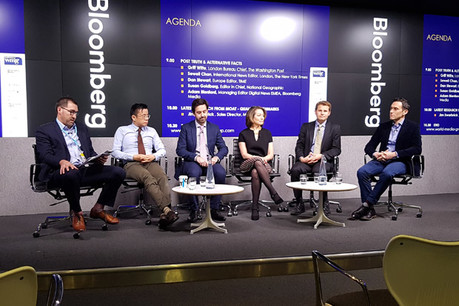
The internet and social media have given those looking to spread false information the ability to write, publish and disseminate material at the touch of a button.
With access to millions of people who interact with these posts, misinformation is able to sway political opinion, push agendas and often make the authors money fast.
"The radical decentralisation of who gets to publish has combined in a very dangerous way with this phenomenon of our living in segmented bubbles, following and liking the sources that we trust and being drawn to news that we are already sympathetic or inclined to," said Sewell Chan, international news editor, London, at The New York Times, speaking at the 'Post truth and alternative facts' event in London today (10 March).
"The combination of how anyone can produce content, with how we consume and share it, is very volatile right now."
So what can news organisations do to tackle the negative impact that disinformation may have on the journalism industry, and the relationship publishers have with their audiences?
Improve your relationship with audiences to help them identify misinformation
"We've got to do a better job of helping consumers of news understand what's real information and what isn't," said Susan Goldberg, editor-in-chief of National Geographic, noting that even the 'pizzagate' news story alleging Hillary Clinton ran a child-sex ring in a Washington pizza parlour was believed to be true by some readers.
"I think that we can help by bringing those critical thinking skills that we use in the newsroom to consumers, by just helping them become more literate about the media in what's real and what isn't, and showing that if it doesn't smell right, it might not really be right."
Chan agreed, but explained that the communication between a publisher and its audience has to be strong in order to do this.
"We especially need to listen to readers' concerns very carefully – ensuring we're listening to their complaints about any bias or inaccuracy," he said.
"That's one thing that I beseech consumers to look at. It doesn't matter which organisation, do they have a procedure for looking into what is factually verified, and do they have a way of handling complaints? I think that's a big part of it."
Inspire curiosity – alter the way facts are presented to readers
Goldberg referred to a 2014 study from scholar Dan Kahan at Yale Law School, which showed that what many people believe about climate change is not based on what they know, but rather who they are, explaining that publishers should be aware that people's opinions are part of their identity.
"Continuing to hammer people with statistics and facts isn't going to break through that, because people feel a little bit assaulted by that information. It's like, 'hey that guy can't be right because I believe something else'," she said.
"We have to figure out how to tell stories that can appeal to them by not directly hammering the kind of studies that we at National Geographic write about, but more stories about, say, how climate change is affecting the animals in the Galapagos.
"It's about figuring out different ways of telling stories to make them more palatable and understandable to consumers."
With an erosion of trust in experts, expertise and even knowledge itself, Chan explained, publishers have to think outside of the box when it comes to storytelling.
"The production of more facts cannot be a bad thing, but I think the assumption of journalism and academia has been that if we simply produce more factual knowledge, that will help societies remain democratic, and I don't think this stands anymore," he added.
Remain an impartial news organisation
"We need to ensure that what we report is accurate and that we don't sacrifice our independence, that we do not jump into the partisan frame and become partisan ourselves," said Griff Witte, London bureau chief for The Washington Post, explaining that it is common for biased news to draw a lot of attention.
"What we need to do is report honestly, accurately and truthfully. Our job is to understand how others see the world, whether you agree with them or not.
"It's especially important now that we don't allow ourselves to be characterised as opponents of a certain politician, party or administration. That's what the purveyors of fake news would like, for the journalists who are trying to be independent, objective and accurate to be discredited as partisans, and if we allow this to be, then we lose."
Goldberg agreed, noting that she doesn't allow any editorial staff at National Geographic to get involved with rallies or debates, because it can be easy to write a reaction to something that then changes the way your audience perceives your reporting.
"I tell them to do the 'count to ten' rule: once you've gone to post something, count to ten and think about whether you really want to push that. A lie will get halfway around the world before the truth has put its pants on, and that is also true of our opinions on social media," she said.
Free daily newsletter
If you like our news and feature articles, you can sign up to receive our free daily (Mon-Fri) email newsletter (mobile friendly).
Related articles
- Building media literacy in the age of Zuck and Musk
- What the news community says about Zuck’s plans to bin fact-checking
- News media must change tactics when fighting false information to protect democracy
- Sky News producer and psychotherapist James Scurry: 'Journalists are a decade behind the latest knowledge about mental health'
- University of Central Lancashire pushes for stronger news literacy education in the UK
